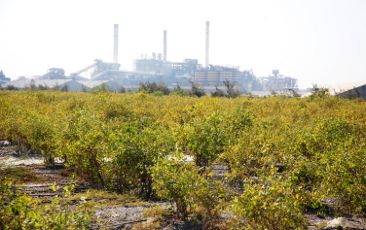
Short description
Loss of land, dust emissions, poor aesthetics, public discontent, and regulatory pressures were the triggers for finding sustainable solutions. In course of time, people inhabited areas close to the site and the dump site became a point of discontent with the new residents due to dust constantly flying about, as high wind speeds prevail in these areas. To avoid the menace of dust, many attempts were made to reclaim the dumpsite through plantations, but the attempts were in vain.
A team was formed to work on alternative ways to improve things. The team came up with an innovative solution: The use of bio-fertilizers and bio-remediation techniques to remediate the solid wastes and develop a green cover. It has resulted in the effective utilization of the waste generated to grow the plantations and, hence, contributed to the improvement of the environment. Simultaneously, TCL developed techniques for filtration of effluent solids and its subsequent use for cement manufacturing in solids generation.
Project benefit
- Support green technology
- Strengthen the ecological company-profile
- Protect the environment
| Initiator | TATA Chemicals Limited |
| Project start | 1993 |
| Status | ongoing |
| Region | India |
| Contact person | Sabina Ratti |
| Awards | - |
| Anti-Corruption | - |
| Business & Peace | - |
| Development | - |
| Environment | X |
| Financial Markets | - |
| Implementing UNGC Principles in your Corporate CSR Management | - |
| Human Rights | - |
| Labour Standards | - |
| Local Networks | - |
| Advocacy of global issues | - |
| Business opportunities in low income communities/countries | - |
| Project funding | X |
| Provision of goods | - |
| Provision of services/personal | - |
| Standards and guidelines development | X |
Greening of Saline and Alkaline Sediments
By Sujit Patil (TATA Chemicals)Tata Chemicals Limited (TCL), which was established in 1939, today is the second largest producer of soda ash in the world with manufacturing facilities across four continents. TCL’s journey as a synthetic soda ash manufacturer began in Mithapur, on the coast of Gujarat, on India’s west coast, and for many years Mithapur represented the sum total of TCL’s soda ash manufacturing. Over time TCL’s Mithapur production volume has grown from 80 tons per day in 1944 to its current level of 2,400 tons per day. The volumes of wastes generated from its operations have grown as well. Solid waste disposal was one of TCL’s biggest concerns. Before setting up the cement manufacturing plant that converts these effluent solids into cement in 1993, all the solid waste generated was stored in a corner of the factory site called Malara. more[...]
Write a comment about this page
Your comments are provided by your own free will and you take sole responsibility for any direct or indirect liability. In order to maintain the highest discussion quality, all comments will be reviewed by our editors. You hereby provide us with an irrevocable, unlimited, and global license for no consideration to use, reuse, delete or publish comments in accordance with our Community Guidelines.
About Us // Privacy Policy // Copyright Information // Legal Disclaimer // Contact
Copyright © 2012-2018 macondo publishing GmbH. All rights reserved.
The CSR Academy is an independent learning platform of the macondo publishing group.








